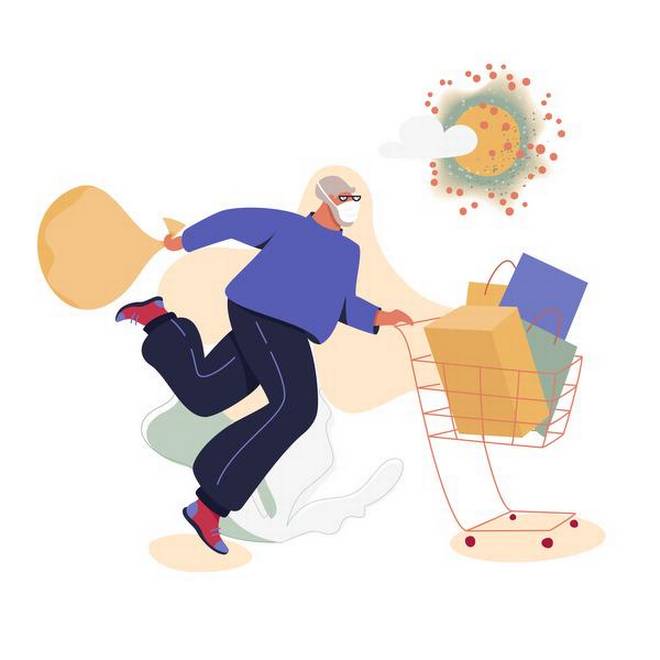
After incurring losses of about ₹90,000 crore this lockdown, the organised retail sector is working on strategies to stay in the game
The lockdown is easing in several parts of the country and non-essential shops are getting back in business. But after having to shut shop for close to three months, it can never be ‘business as usual’. Retailers have returned to markets where people can no longer crowd into shops, where eager shoppers won’t be window-shopping and jam-packed malls are a thing of the past.
The organised retail sector has borne losses to the tune of ₹90,000 crore in the last two months. Revenues have been nil, but expenses continue to mount: EMIs, rent, maintenance, staff salaries, etc. “The shopping centres industry has made investments in excess of ₹1 lakh crore in fixed assets, in addition to land costs. An additional ₹27,000 crore has been invested in ongoing projects,” says Amitabh Taneja, Chairman, Shopping Centres Association of India (SCAI), who fears defaults in excess of ₹70,000 crore and mounting job losses, if relief isn’t provided to the sector.
While the RBI has reduced the interest rate by 40bps and extended the moratorium by another three months, Taneja says these steps are unlikely to provide any significant relief in terms of liquidity. “We have been seeking a longer term moratorium as well as a one-time loan restructuring option to overcome the financial stress. We’ve written to the Finance Ministry and the RBI for GST rebates to offset losses on account of and for the period of closure of business,” says Taneja.
Retail reality
Stores in Chennai's shopping districts of Pondy Bazaar and Mylapore and elsewhere have been opening their doors over the last week. Founder of Chennai-based Palam Silks, Jeyasree Ravi, says the future relies on footfalls and how much customers are willing to spend. “We had zero sales in April but continued to pay salaries to staff and weavers and paid for other overhead costs too. While a few customers have bought saris for upcoming weddings, many have postponed events. It is only 15-20% of the general footfall,” she says, adding that landlords have reduced rents by 40-50% for 2-3 months. “However, we have new additional expenses towards safety measures, sanitisation, masks, gloves and pedestal fans.
As part of post-Covid precautions, Ravi is not using air-conditioners at the moment and is encouraging customers to book prior appointments. She also asks them not to visit in groups of more than three people. “Our store at Luz in Mylapore has private shopping cabins, which have turned out to be a blessing in disguise,” Ravi says. The shop is encouraging customers to shop on their website and app, and even using video calls to help.
Like Ravi, several shop owners are struggling to cope with rents and overheads during the lockdown. Experts fear that many shops in malls might have to shut down altogether as costs mount.
Industry speak
The growth of organised retail in India is likely to slow down, says Anuj Kejriwal, MD and CEO, Anarock Retail. “In the pre-Covid months of 2020, the sector accounted for just 10% of the market share, and was expected to grow to 25% by 2025. Now, this may take a longer time.” That said, positive trends are emerging. “Local shops have gained significant customer confidence and mall owners are now re-strategising operations.”
Given the situation, what are associations like SCAI and other industry players doing to improve things? Taneja says his organisation has been engaging with the government and making representations asking shopping centres and malls to be allowed to operate. “A detailed 48-page report based on best practices from across the world [where malls have resumed operations] has been submitted to the government, he says, adding, “We do understand that the post-Covid-19 scenario will see strict measures to curtail the spread of infection, but we also believe that malls are best suited to implement strict protocols to ensure crowd control, implement social distancing norms, and provide a hygienic shopping environment.”
Munish Khanna, Chief Revenue Officer, Express Avenue, and a member of SCAI, is awaiting the government’s directive to start operations. “Considering the current liquidity situation of our retail partners, we haven’t raised any invoices yet. Quoting the SCAI’s norms, he says, going forward, we can expect masks to be compulsory, customer touch points to be regularly sanitised, a restricted washroom policy, crowd control, and temperature screening.”
A pre-Covid file photo of Express Avenue in Chennai | Photo Credit: V_GANESAN
Going forward
Retailers will have to look for ways to provide a contact-less shopping experience all around, says Kejriwal, suggesting virtual trial rooms as one option. “In order to maintain social distancing in fine-dining restaurants, owners could look at fewer tables, customers perusing menus on phones, UV sanitised cutlery, etc.,” he adds.
Given public apprehension to step into crowded places, is e-commerce going to increase? Online businesses have doubtlessly gained momentum. “Over 5,000 stores have been added to the fleet of leading e-commerce players during the lockdown, and more will follow. Interestingly, the consumer base is also expanding, with even senior citizens embracing technology,” says Kejriwal. That doesn’t mean brick and mortar will fade away because malls are primarily experience centres rather than plain shopping outlets, as Kejriwal explains. "With travel not on the priority list for many, malls may be the only entertainment option left. We will see the continued coexistence of online and physical retail.”





















